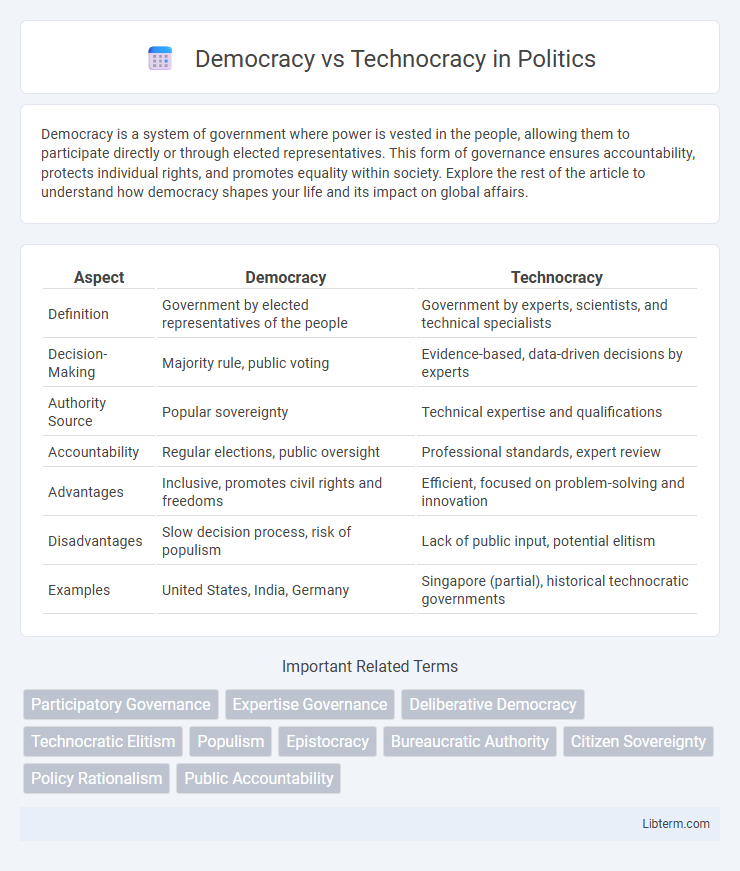Democracy is a system of government where power is vested in the people, allowing them to participate directly or through elected representatives. This form of governance ensures accountability, protects individual rights, and promotes equality within society. Explore the rest of the article to understand how democracy shapes your life and its impact on global affairs.
Table of Comparison
| Aspect | Democracy | Technocracy |
|---|---|---|
| Definition | Government by elected representatives of the people | Government by experts, scientists, and technical specialists |
| Decision-Making | Majority rule, public voting | Evidence-based, data-driven decisions by experts |
| Authority Source | Popular sovereignty | Technical expertise and qualifications |
| Accountability | Regular elections, public oversight | Professional standards, expert review |
| Advantages | Inclusive, promotes civil rights and freedoms | Efficient, focused on problem-solving and innovation |
| Disadvantages | Slow decision process, risk of populism | Lack of public input, potential elitism |
| Examples | United States, India, Germany | Singapore (partial), historical technocratic governments |
Introduction to Democracy and Technocracy
Democracy is a political system where power is vested in the hands of the people, typically through elected representatives, emphasizing majority rule and individual rights. Technocracy, in contrast, is governance by experts and specialists who make decisions based on technical knowledge and data rather than popular opinion. Both systems prioritize different approaches to decision-making: democratic legitimacy versus expertise-driven efficiency.
Defining Democracy: Principles and Practices
Democracy is grounded in the principles of political equality, popular sovereignty, and the rule of law, enabling citizens to participate directly or indirectly in decision-making processes. It operates through practices such as free and fair elections, transparent governance, and protection of fundamental rights, ensuring accountability and legitimacy. These mechanisms foster inclusive representation and safeguard individual freedoms within a pluralistic society.
Understanding Technocracy: Origins and Ideals
Technocracy emerged during the early 20th century as a movement advocating for governance by experts and scientists, prioritizing efficiency, data-driven decision-making, and technological advancement. Rooted in principles of rationality and specialized knowledge, technocracy seeks to replace political ideologies with technical expertise to solve complex societal problems. This approach emphasizes optimally managed resource allocation, infrastructure development, and policy formulation based on empirical evidence rather than popular opinion.
Historical Evolution of Both Systems
Democracy originated in ancient Athens around the 5th century BCE as a direct form of citizen participation in governance, evolving through centuries into representative systems worldwide. Technocracy emerged in the early 20th century, particularly during the 1930s, advocating for governance by technical experts and scientists to optimize decision-making based on data and expertise. Both systems reflect distinct approaches to authority: democracy emphasizes popular sovereignty and electoral accountability, while technocracy prioritizes specialized knowledge and efficiency in policy implementation.
Decision-Making Processes: People vs. Experts
In democracy, decision-making processes prioritize the collective will of the people, emphasizing transparency, public debate, and voting to shape policies. Technocracy centers on expert-driven decisions where specialized knowledge and data analytics guide policy formulation, often bypassing broader public opinion for efficiency and scientific rigor. The contrast highlights a tension between inclusive participation in democracies and technocracies' reliance on expert authority to tackle complex societal challenges.
Accountability and Representation in Governance
Democracy ensures accountability through elected representatives who are directly answerable to the public, fostering transparency and citizen participation in decision-making processes. Technocracy emphasizes expertise and efficiency, with governance led by specialists who prioritize data-driven policies, sometimes at the expense of direct representation. The tension between democratic accountability and technocratic competence highlights the challenge of balancing popular legitimacy with effective governance.
Efficiency and Effectiveness in Policy Implementation
Technocracy prioritizes efficiency and effectiveness in policy implementation by leveraging experts and data-driven decision-making, often resulting in faster and more technically sound solutions. Democracy emphasizes broad participation and accountability, which can slow decision-making but ensures policies reflect diverse public interests and values. Balancing technocratic precision with democratic inclusiveness remains a challenge in optimizing governance outcomes.
Potential Benefits and Drawbacks of Each System
Democracy empowers citizens with equal voting rights, fostering inclusivity and diverse representation but may result in slower decision-making and susceptibility to populism. Technocracy relies on experts and data-driven policies, enhancing efficiency and specialized problem-solving while potentially limiting public accountability and marginalizing ordinary voices. Balancing democratic participation with technocratic expertise can optimize governance by integrating legitimacy and effectiveness.
Real-World Examples and Case Studies
Democracy in the United States showcases citizen participation through elections and legislative processes, emphasizing individual rights and checks and balances. Technocracy is exemplified by Singapore's government, where policy decisions prioritize expert knowledge and data-driven approaches to urban planning and economic growth. Case studies reveal democracy's strength in fostering political freedom, while technocracy excels in efficient, specialized governance during complex challenges.
Future Prospects: Balancing Democracy and Technocracy
Future prospects for governance increasingly hinge on balancing democratic values with technocratic expertise, ensuring that policy decisions are both inclusive and data-driven. Leveraging advanced technologies and evidence-based approaches can enhance transparency, efficiency, and responsiveness while preserving citizen participation and accountability. Emphasizing collaborative frameworks that integrate scientific insights with public input will likely define the evolution of sustainable governance models.
Democracy Infographic

 libterm.com
libterm.com